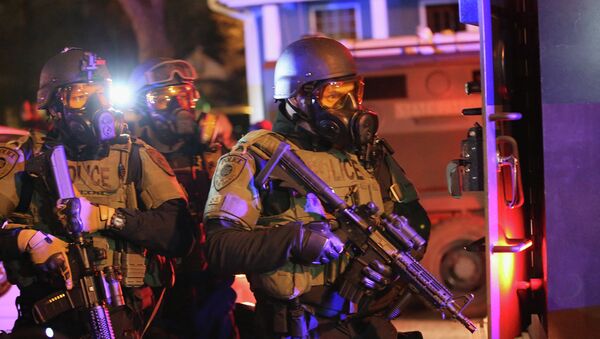EDINBURGH, November 25 (Sputnik) — Police will always have a tendency to target specific racial groups, associated with crime and offending in a particular area, a retired senior police officer told Sputnik Tuesday.
"A good cop will get a feel for who might or might not be worth stopping," Iain McKie, a former police superintendent with 30 years service said. "When racial attributes are taken into account, there is a real problem, however, because it allows for prejudice to take part in the assessment and an accusation of prejudice to be levelled," McKie added.
"If white, black, Romanian, Scots or whoever predominate in an area and they are as a group known to be responsible for crimes or offences, they will tend to be the ones stopped. To the political commentators and critics no matter how accurate the police assessment is, these actions will be criticized," McKie added.
The former policeman, who is now an expert on forensic science, lecturing on the subject across the UK and North America, told Sputnik he was opposed to racial profiling of the kind used by US Police in Missouri.
Racial profiling in the city of Ferguson has been regarded by some, including St. Louis Chief of Police, Sam Dotson, as exacerbating riots and disorder resulting from the shooting of an 18-year-old black man, Michael Brown, by a white police officer.
"I would not seek to defend racial profiling and the excesses that flow from it and as a service the police need to tackle the prejudice and ensure that when people are stopped there is a supportable reason," McKie told Sputnik.
McKie noted that in the UK, despite a legal ban, racial, ethnic and religious profiling had been unofficially used by police for a long time, although not always based on race, highlighting Scotland's long standing religious sectarian divides in the west of the country.
"Profiling of offenders has been used for years, although not necessarily on racial lines," McKie told Sputnik.
"Were there ever accusations that in the West of Scotland that Catholic/Protestant officers might favor their own side? It's the stuff of prejudice and conflict down through the ages," McKie added.
McKie added that in order to take the equality agenda to its logical conclusion, there would need to be cultural, as well as structural changes.
"I would, for instance, state a firm belief in gender equality, but to follow that through to how we police violence and disorder would mean re-assessing how female officers, or for that matter smaller less physical officers, can be allowed to police the front line safely," McKie told Sputnik.
"Equality comes at a price and demands cultural, process and structural change," McKie added. "It is also a cultural issue which training and education might eventually marginalize."
The issue of racial profiling of police gained international attention after an unarmed African-American teenager Michael Brown was shot dead by Darren Wilson, a white police officer, as he was pursuing the teen in relation to a robbery in Ferguson, Missouri. The event led to a series of protests, both peaceful and violent, seeking criminal charges for Wilson. On Monday, a grand jury decided not to indict Wilson in the fatal shooting, which led to a new wave of riots across the country.

